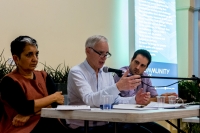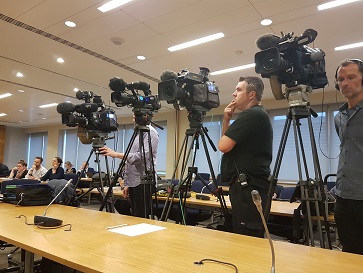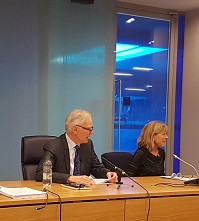UN Poverty Expert Special Rapporteur, Professor Philip Alston, Says UK Policies Inflict Unnecessary Misery
Saturday 17 November, 2018 Written by Simon Collyer
You are cordially invited to the UN Special Rapporteur on extreme poverty and human rights’ presentation of the preliminary findings from his visit to the United Kingdom on Friday, November 16, 2018, at 12:00 pm at the International Maritime Organisation in London - said the invitation
The Special Rapporteur, Professor Philip Alston, will present the findings from his investigation into government efforts to eradicate poverty in the UK, including the impact of austerity measures, Universal Credit, child poverty, Brexit, and an increasingly digital government. The Special Rapporteur has been undertaking an official visit to the UK, and has visited Belfast, Bristol, Cardiff, Edinburgh, Essex, Glasgow, Jaywick, London, and Newcastle, and is meeting with people affected by poverty, civil society, academics, and government officials.
++
We attended the press event which was packed by many of the leading companies in the media world. There was evidently a lot of interest in this report whose findings the government will find difficult to ignore. The ABC was limited to one question and we asked had Professor Philip Alston had he been given the figures for those who had died after being found 'Fit For Work' by the DWP. NO was the answer. We felt concern, as we believe there would be a predictive list somewhere of those at risk of dying following a 'No Deal' BREXIT. The Professor admitted in his presentation that revenues and therefore tax revenues would fall.

Image: Media interest was very high.
To be fair much of the information was already in the public domain. However, we pointed out that there are many subtle changes that come with Universal Credit. The full housing benefit amount is not paid and claimants have to use the part of the benefit needed to live on to subsidize this rent payment. That the DWP can now sanction ALL of your benefits including the Housing Benefit part.
Professor Alston's report was very well drafted and he came across as someone compassionate and with great regard for human rights. The professor had to be polite to his hosts the British government, but this report was no whitewash by any means. Professor Alston had found MP's indifferent in some cases and lacking knowledge in other cases, MP's had complained the number of time benefits issues was taking up. About 43 MP's were spoken too and one was left with the feeling that the political class do not understand the issues and some feel that a harsh benefits system helps people into work. It is possible that the reverse is the case.

Image: Professor Alston and Karen Davis, of the UN Regional Information Centre for Western Europe.
This is what the Professor has to say. Attached far below is his press release.
UN poverty expert says UK policies inflict unnecessary misery
LONDON (16 November, 2018) – The UK Government’s policies and drastic cuts to social support are entrenching high levels of poverty and inflicting unnecessary misery in one of the richest countries in the world, a UN human rights expert said today.
“The United Kingdom’s impending exit from the European Union poses particular risks for people in poverty, but the Government appears to be treating this as an afterthought,” the UN Special Rapporteur on extreme poverty and human rights, Philip Alston, said at the end of a 12-day visit to the country.
Almost all studies have shown that the UK economy will be worse off after Brexit. Consequences for inflation, real wages, and consumer prices will drive more people into poverty unless the Government takes action to shield those most vulnerable and replaces current EU funding for combatting poverty, he said.
In the United Kingdom, 14 million people, a fifth of the population, live in poverty. Four million of these are more than 50 percent below the poverty line, and 1.5 million are destitute, unable to afford basics essentials. After years of progress, poverty is rising again, with child poverty predicted to rise 7 percent between 2015 and 2022, homelessness is up 60 percent since 2010, and food banks rapidly multiplying. “In the fifth richest country in the world, this is not just a disgrace, but a social calamity and an economic disaster, all rolled into one,” Alston said.
“During my visit I have spoken with people who depend on food banks and charities for their next meal, who are sleeping on friends’ couches because they are homeless and don’t have a safe place for their children to sleep, who have sold sex for money or shelter, children who are growing up in poverty unsure of their future,” Alston said. “I’ve also met young people who feel gangs are the only way out of destitution, and people with disabilities who are being told they need to go back to work or lose benefits, against their doctor’s orders,” Alston said.
Successive governments have presided over the systematic dismantling of the social safety net in the United Kingdom. The introduction of Universal Credit and significant reductions in the amount of and eligibility for important forms of support have undermined the capacity of benefits to loosen the grip of poverty. “British compassion for those who are suffering has been replaced by a punitive, mean-spirited, and often callous approach,” Alston said.
“As a ‘digital by default’ benefit, Universal Credit has created an online barrier between people with poor digital literacy and their legal entitlements,” Alston said. “And the ‘test and learn’ approach to the rollout treats claimants like guinea pigs and can wreak havoc in real peoples’ lives.”
Local governments in England have seen a 49 percent real-terms reduction in Government funding since 2010, with hundreds of libraries closed, community and youth centres shrunk and underfunded, and public spaces and buildings including parks and recreation centres sold off.
“I was told time and again about important public services being pared down, the loss of institutions that would have previously protected vulnerable people, social care services that are at a breaking point, and local government and devolved administrations stretched far too thin,” Alston said. “The voluntary sector has done an admirable job of picking up the slack for those government functions, but that work does not relieve the Government of its obligations.
“The Government has remained in a state of denial, and ministers insisted to me that all is well and running according to plan,” Alston said. “Despite making some reluctant tweaks to basic policy, there has been a determined resistance to change in response to the many problems which so many people at all levels have brought to my attention.”
During his visit, the Special Rapporteur traveled to nine cities in England, Northern Ireland, Scotland and Wales, and met with people affected by poverty, civil society, front line workers, and officials from a range of political parties in local, devolved and UK Governments.
“Government policies have inflicted great misery unnecessarily, especially on the working poor, on single mothers struggling against mighty odds, on people with disabilities who are already marginalised, and on millions of children who are locked into a cycle of poverty from which many will have great difficulty escaping,” Alston said.
This was the Facebook Livestream: https://www.facebook.com/AlstonUNSR/videos/207369616828528/UzpfSTEzMTQzMTI1NDg6MTAyMTc3NjA0NDMzMDU1MTk/
ABC Comment: have your say below:

ABC Note: UN poverty expert says 'UK policies inflict unnecessary misery'. Please see press release below:

Leave a comment
Make sure you enter all the required information, indicated by an asterisk (*). HTML code is not allowed.
Join
FREE
Here










